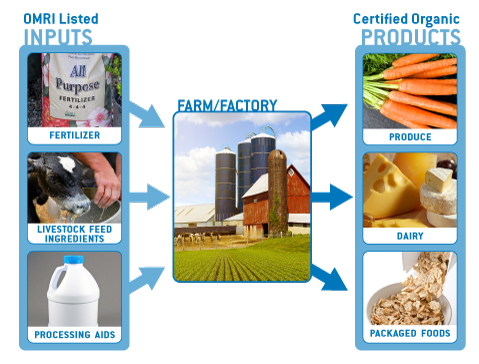What We Do

OMRI lists input products such as fertilizers, pest controls, and livestock care products that are compliant with organic standards. Allowed products are "OMRI Listed®" and may display the OMRI seal. These "input" products are then used to produce organic food and fiber products such as carrots, granola bars and cotton that are certified by an accredited certifying body.
OMRI verifies input products intended for use in organic production. By focusing exclusively on inputs, OMRI provides essential expertise to support the organic certification process. On average 10-15% of the applications that OMRI receives do not make it through the process, either because the application is withdrawn by the applicant, or the product is determined to be prohibited.
What is Organic?
In the United States, the term "organic" is federally regulated and governed by standards in the Code of Federal Regulations only when used on food or fiber products. Food and fiber products that use the term "organic" are required to be certified by an independent third party certifier, with an exception for very small-scale producers with earnings below a certain amount. All producers that use this term are required by law to follow organic practices. The term "organic" is not currently regulated for many non-food products such as pet food, cosmetics, household products and fertilizers. These products may meet non-government, privately maintained standards, but the use of the term "organic" on labels is not federally regulated for these non-food products. For example, a fertilizer may be "OMRI Listed," meaning that it meets OMRI's standards for a fertilizer, but almost any fertilizer can use the term "organic" on the label. Canadian laws are similar regarding what can and can't be called "organic."
To become certified organic, a conventional farmer must first undergo a three-year transition period, during which time no prohibited inputs can be used. Organic certifiers can provide support for the transition process, helping the farmer understand and follow the organic standards. Once the three-year period is complete, the farmer can start to produce organic food. The farmer completes an "Organic System Plan" that explains how the food will be produced, including a list of all inputs that will be used, and the farm undergoes an annual certifier inspection.
Is OMRI a certifier?
No, OMRI does not certify food or fiber products. OMRI is the only independent, nonprofit organization dedicated exclusively to inputs. OMRI is a trusted third-party nonprofit organization that is accredited to ISO 17065 standards by the USDA Quality Assessment Division. Where certifiers focus on the food and fiber products that you see on the grocery store shelves, OMRI verifies the substances used in organic production: fertilizers, pesticides, livestock health care products, processing aids, and a number of other products that organic farmers and processors rely on every day. OMRI works with all certifiers to ensure that materials used in organic food production meet the organic standards, in accordance with consistent criteria and review methods.

OMRI's Mission
OMRI is a 501(c)3 nonprofit with a mission to support organic integrity.

How OMRI Helps
The organic community explains what OMRI means to them.

Calendar
Let's meet! Check OMRI's calendar and connect with us at the next local tradeshow or conference.








